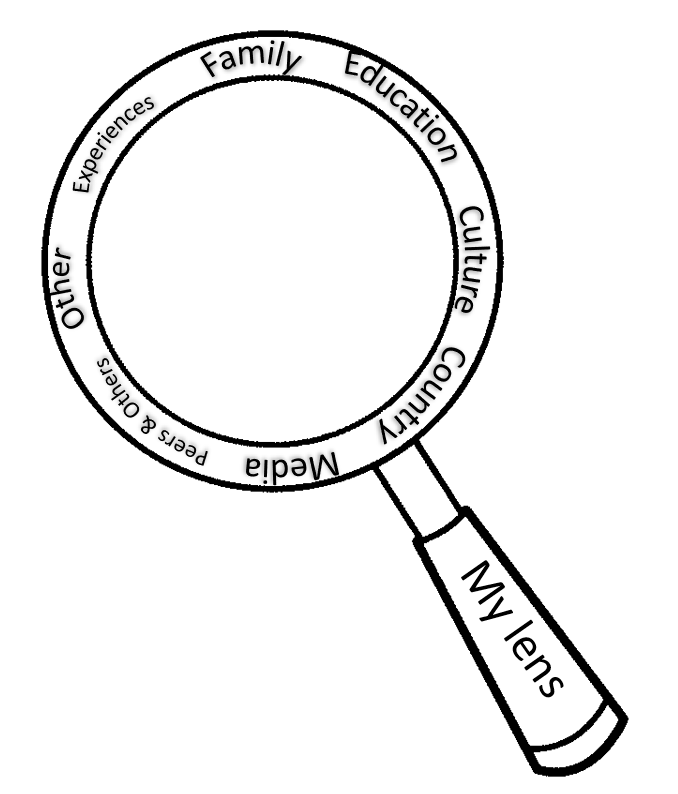
This blog is going to introduce the idea of using lenses in RE to help students to understand the way that the disciplines of RE ‘work’ but also specifically how the idea of lenses can help us as teachers address misconceptions in RE.
I’ve developed this idea of lenses to introduce to year 7 to help them understand how people view the world (some people like to call this a worldview). I have already blogged on how lenses are can be an important aspect of student views here and this helps them understand their own personal lens and how it might have been developed and will continue to develop over time. Some have called this ‘positionality’. Ofsted HMI RE subject lead Richard Kueh has shared their thinking on this here and refer to it as ‘personal knowledge’.
However the idea of lenses can be used for students to be introduced to other lenses. In RE this isn’t just ‘religious’ lenses but a wide range of variations and combinations. It gives a framework for them to understand that not everyone if the same as them and as they study religion and belief can give them a better conceptual framework to pin their knowledge and understanding to.
The analogy isn’t perfect and has flaws but for secondary students it is useable and those flaws can even become part of the discussion. Once they’ve been taught about this concept, the lenses can pop up at various times throughout the curriculum. I’ve found it particularly useful in spontaneous discussion with students as a reference point to go back to.
Big questions
This image helps students to consider how different lenses will mean different responses to ‘big’ questions in life and helps to appreciate that their lens or view will come from a different perspective to others’. This could be particularly useful when teaching moral and ethical issues.
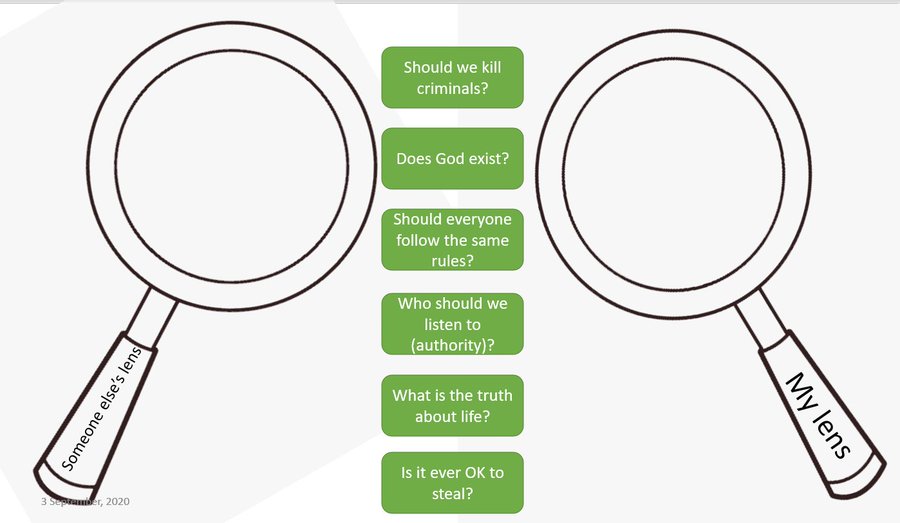
Disciplinary lenses
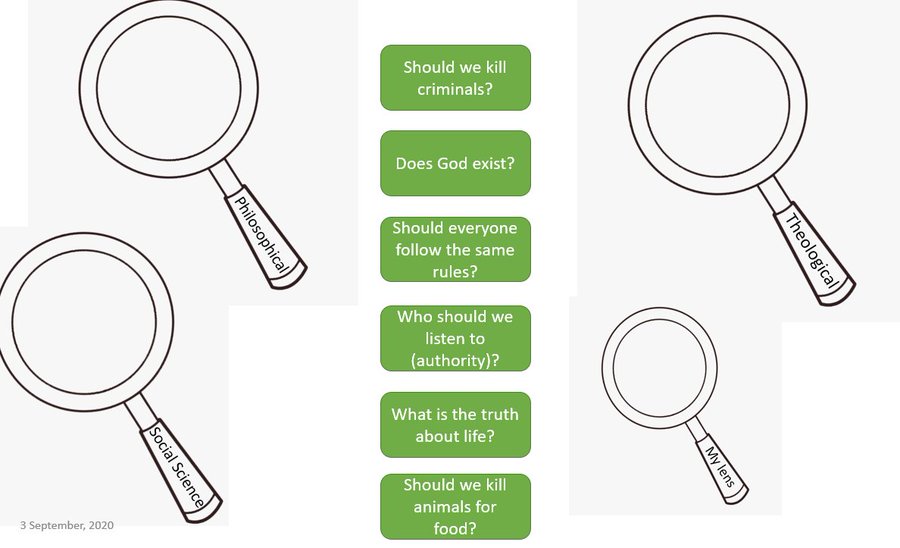
I’ve discussed how disciplinary knowledge is part of argumentation in RE here so the idea of a disciplinary lens is an obvious way for students to be able to see that when we approach a topic or and idea we can also use a disciplinary lens. These lenses provide a way of approaching substantive knowledge (the content of what we teach) from the different disciplines (ways of knowing’) in RE.
Multiple lenses
This is where the power of the lens idea comes through; using multiple lenses.
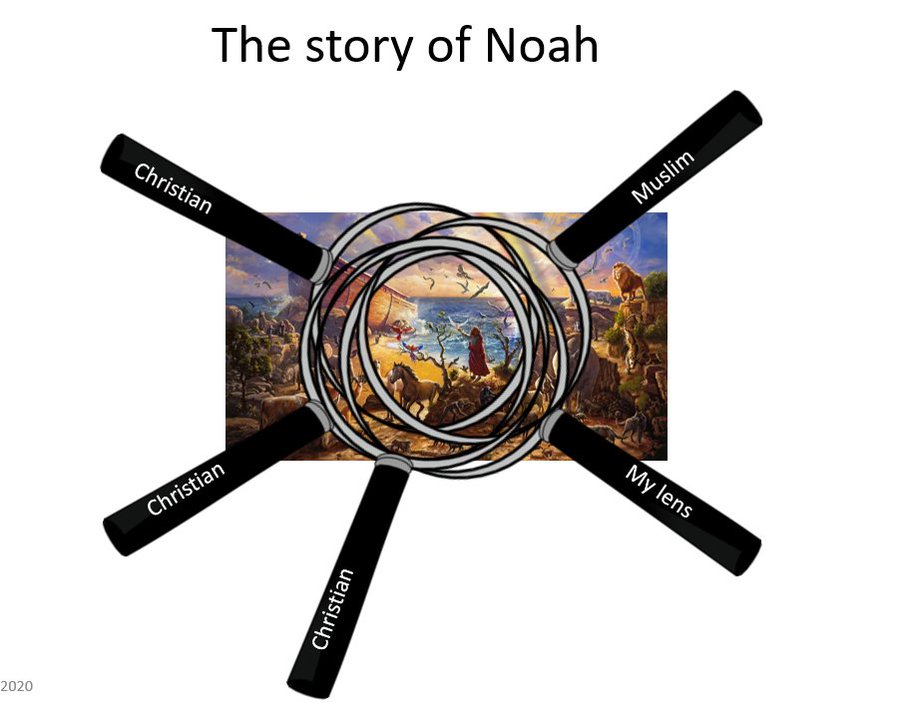
This image was designed to show that there are multiple possible interpretations to the story of Noah. In particular that there isn’t just one Christian interpretation but several. Also that just because they might associate it with Christianity to let them know that the story exists in other religious texts but this would mean that other religions have a different view of the Christian story.
I didn’t emphasise this at the time but now considering how the lenses overlap could become an important point to make. Where do views overlap on what they believe? What are these points of overlap? I could have my own non-religious view of a religious story that may well be similar in nature to a religious interpretation e.g. I can think that the Parable of the Good Samaritan gives a good guide for life without being a Christian.
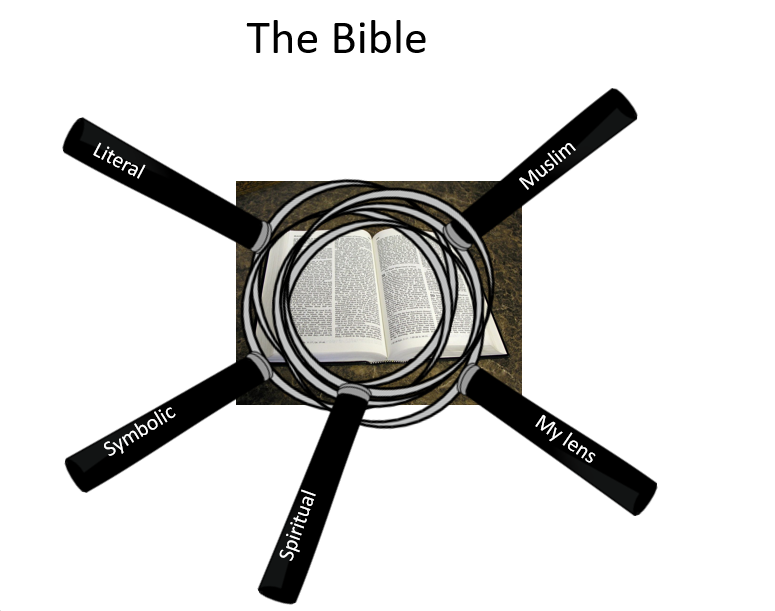
This image was designed to help understand Biblical interpretations. We use this for example when looking at the creation story in Genesis. This would support introducing students into Hermeneutics (exploring the different potential messages within a text and interpretations of a text).
Lenses & misconceptions
Whilst writing a different blog that touched upon misconceptions, I realised that this is where lenses are crucial. If I think about the classic misconceptions that students have in RE, so many of them might be prevented with a solid understanding of lenses or with the foundations of lenses already made, to support my explanations to address these misconceptions much clearer and logical for students to understand.
Let’s take some misconceptions in RE and think about how these lenses might be used to address them….
“Science is in opposition to religion”
This misunderstanding comes from the idea that lenses don’t ‘overlap’; the scientific lens cannot be used in combination with a religious one. This layering of lenses allows students to see that there are infinite layers of lenses. If we teach students that certain lenses are not necessarily unique or standalone then this misconception can be addressed by an image like this:
It is important for us to present these as ‘A lens’ it’s one of many potential lenses, not ‘the only Christian lens’.
A good example is looking at views on how the world was created. Many students assume that you either believe in science or if you’re a Christian you literally believe the Genesis narrative. Using the lenses here can help students appreciate that there can be a more complex relationship between them.
Again the layering could also be analysed. This Christian lens has ‘space’ that the scientific lens doesn’t. What does this Christian lens believe that the scientific lens cannot fully mirror? What does the scientific ‘space’ contain that might not mirror with this Christian view? How much do the lenses overlap? Why? Why might the ‘space’ be different for different people?
“Catholics are not Christians”
This may come from a lack of understanding of Christian denominations. Considering different denominations as different lenses can help students understand how lenses can have commonalties but also differences.
This first image illustrated that the denomination lenses are separate however this second image could be used to discuss similarities and differences. I guess it almost becomes a three way Venn diagram. It is important here to start unpicking the difference between doctrine and personal views as well.
Some historical substantive knowledge here would also probably help.
“Everyone in a denomination believes the same thing”
This links in to the misconception above and gives a good opportunity to explore the difference between doctrine and personal belief. Students need to understand that whilst someone may identify with a specific denomination/school/sect this doesn’t mean that they agree or indeed believe its official doctrine. An example of this is where a personal religious lens meets a doctrinal religious lens. Issues where this might provide a useful structure are controversial issues such as abortion, contraception & sexuality.

This shows that even within a denomination there are variations of ‘lenses’. You could explore what these might include and why they exist. This will mean looking through theological and social science lenses so should include a rich discussion on interpretation & personal belief.
“Sikhs have a kirpan to attack people”
Context is such an important concept in RE. Students need substantive historical & cultural knowledge to be able to understand that their 2021 lens may not interpret things in the same way as a 30CE or 640 CE lens or even a 1960CE lens. Having a sense of ‘time’ and ‘context’ can be help to prevent these misconceptions. Students can’t help but apply a 2021 UK lens when introducing the kirpan. Their context is “knives are used for cooking or for stabbing someone. The kirpan looks like a knife so….”. Using historical knowledge and ‘time’ lenses can help students to understand the historical, symbolic and spiritual significance of the kirpan for Sikhs
“A large % of the UK is Muslim”
I’ve heard this a few times. Students have an overinflated view of the numbers of Muslims in the UK. A social sciences lens is perfect here. Looking at the reality of numbers will help them to get a more realistic picture of the Muslim Community. And of course it’s important to then unpick where this misconception has come from e.g. the media, family etc
“Jesus was white”
A classic misconception but do students understand how this idea has come about? This is a great topic to look at sociological, cultural and historical lenses.
I’m going to stop now, I’m sure you get the idea. I’m sure there are other misconceptions that might use the lenses differently. This isn’t for every lesson; it’s for when the analogy can support understanding. As we gain experience as teachers, in some cases we do what we can to counter misconceptions before they arise. I hope this has provided some inspiration to how the lenses can help provide a framework for discussing and addressing misconceptions. I’d love to hear more examples.













